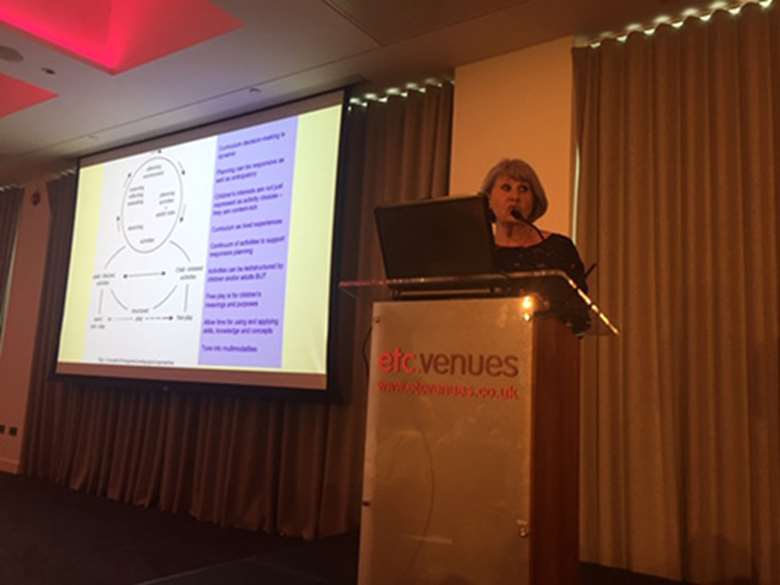Exclusive: 'Avoid a Tesco curriculum', says leading academic
Thursday, July 11, 2019
Settings should avoid ‘a Tesco-delivery’ model of early years curriculum under the new Ofsted inspection framework, Professor Elizabeth Wood has warned.

Talking at the Nursery World conference in London on the new inspection framework, Professor Wood, of the University of Sheffield, cautioned against settings resorting to commercially produced schemes of learning in their attempt to deliver the broad curriculum and ‘Quality of education’ expected under the new inspection judgement.
She told the 450 delegates, ‘The idea of intent, implementation and impact could very easily be interpreted as a Tesco-delivery model of curriculum. And I’m sure that you all understand very well that what you do on a day-to-day basis with children and families is much more complex than that.’
Under the new framework, there is the expectation that practitioners will deliver broad learning tailored to the individual children in their particular setting. However, noted Professor Wood, ‘I’ve already seen some examples of commercial companies producing ready-made curricula that they assume can be used in your complex and very diverse settings. I would argue that there is no substitute for professional knowledge.
‘Some of the commercial schemes I’ve seen I am struggling to understand what kind of children they had in mind when they were writing [them] and what theories of learning may or probably didn’t operate in their conceptualisation. So, please, beware of commercially-constructed curricula. You know your children best. The idea of being culturally responsive is not something that you will find in many commercially-produced curriculum frameworks.’
Curriculum, she continued, is not something that is ‘delivered’ and resides only in policy texts, rather it is something that is ‘lived and experienced’. ‘Curriculum is everywhere,' she explained, arguing that the three important concepts that feed into children’s learning and should provide the basis for the broad, coherent and sequenced curriculum that Ofsted will be looking for are children’s:
- interests
- working theories (children’s evolving ideas and understanding of the world around them as they engage with others, in their home, community and cultural lives), and
- funds of knowledge (that children access in their home, community and nursery life and draw on to co-construct meaning)
The EYFS – the curriculum as text – she said should, therefore, be viewed as ‘minimum standards’, a starting point for a curriculum that, she argued, should have less of the current bias towards skills and behaviour and be more ‘conceptually rich’.
She said, ‘I would argue that the EYFS prescribes barely minimum standards for children to achieve. I would argue that your standards are much more [like the] maximum than what is in the Early Years Foundation Stage.’
Speaking about a co-constructed curriculum, she used the example of one four-year-old’s interest in animals and dinosaurs. ‘Aneni is a knowledge seeker,' she explained. 'He wants to find out about dinosaurs. And more importantly his parents help him to engage in sources of knowledge. So, here we have interests being driven by inquiry, where that inquiry is about knowledge-seeking and developing his funds of knowledge.
‘Importantly for Aneni, this helps him to become a competent user of knowledge in his pre-school setting. Knowledge really is power to children. And I think it is important that we engage with the forms of knowledge that children bring to the setting, as well as the forms of knowledge that are inscribed in the Early Years Foundation Stage.’
However, she was highly sceptical that settings would be able to develop such broad and meaningful curricula given ‘the increasing intervention of Ofsted in matters of quality, play, pedagogy, assessment, school readiness, professionalism, professional knowledge, reading…’.
‘In the last 15 years,’ she noted, ‘we have witnessed the increasing intervention of Ofsted in all matters to do with early childhood and education.’
Citing Ofsted reports, including Bold Beginnings and Teaching and Play in the Early Years, she said that Ofsted was setting out what it expects to see and even giving definitions of how they understand pedagogy and early childhood. ‘What we see now is Ofsted recasting its focus on curriculum, which they claim has been missing in action.
‘Ofsted is now the sole arbiter of quality in your settings and I’d like you to reflect critically on whether that is desirable or ethical.’




